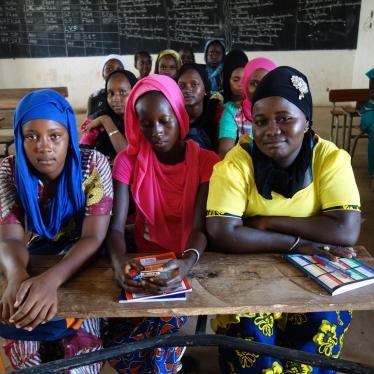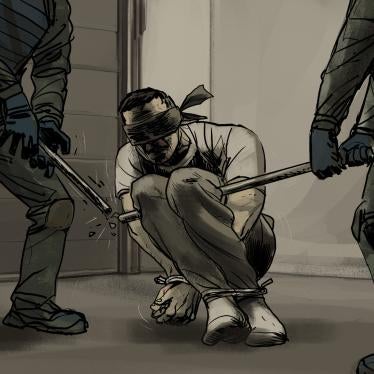(Raipur) - The Indian central and Chhattisgarh state governments should hold accountable government security forces and state-backed vigilantes responsible for attacking, killing, and forcibly displacing tens of thousands of people in armed operations against Maoist rebels since mid-2005 in southern Chhattisgarh, Human Rights Watch said in a new report released today.
Human Rights Watch called for an end to all government support for unlawful activities by the Salwa Judum vigilantes, and urged affected state governments to take immediate measures to protect the tens of thousands of persons displaced. Human Rights Watch also called on Maoist rebels known as Naxalites to end attacks on civilians and other abuses.
The 182-page report, “‘Being Neutral Is Our Biggest Crime’: Government, Vigilante, and Naxalite Abuses in India’s Chhattisgarh State,” documents human rights abuses against civilians, particularly indigenous tribal communities, caught in a deadly tug-of-war between government security forces and the vigilante Salwa Judum and Naxalites.
Human Rights Watch found that since mid-2005 government security forces and members of the Salwa Judum, which officials falsely describe as a spontaneous citizen’s anti-Naxalite movement, attacked villages, killed and raped villagers, and burned down huts to force people into government camps. Human Rights Watch collected more than 50 eyewitness accounts of attacks involving government security forces in 18 different villages in Dantewada and Bijapur districts in Chhattisgarh. At the same time, the Naxalites have carried out bombings, and have abducted, beaten, and executed civilians, particularly those suspected of supporting the Salwa Judum. Tens of thousands of internally displaced persons (IDPs) are stranded in government camps in Chhattisgarh or in the forestlands of neighboring Andhra Pradesh state.
“The Chhattisgarh government denies supporting Salwa Judum, but dozens of eyewitnesses have described police participating in violent Salwa Judum raids on villages – killing, looting, and burning their hamlets,” said Jo Becker, children’s rights advocacy director at Human Rights Watch and member of the research team. “Instead of promoting vigilantes, the Chhattisgarh government should be promoting respect for human rights and pursuing accountability.”
“Being Neutral Is Our Biggest Crime” is based on four weeks of on-the-ground research in Chhattisgarh and Andhra Pradesh in late 2007 and early 2008, including approximately 175 accounts from affected villagers, Salwa Judum leaders, government officials and police, and former Naxalites.
Naxalite rebels have retaliated in a brutal manner, abducting, assaulting, and killing civilians perceived to be Salwa Judum supporters. Even before the conflict escalated in mid-2005 due to Salwa Judum’s operations, the Naxalites have been responsible for widespread human rights abuses, including torture, extortion, summary executions, and the recruitment of child soldiers.
The conflict has given rise to one of the largest internal displacement crises in India – at least 100,000 people have resettled in camps in southern Chhattisgarh or fled to neighboring states, principally Andhra Pradesh, according to Human Rights Watch. Those living in camps have limited access to government health care or livelihood opportunities. Basic sanitation is often lacking. According to some camp residents, the government has cut or failed to provide free food rations. The conflict has forcibly displaced and resettled many other villagers to sites in southern Chhattisgarh that are not recognized as camps by the government. Such populations are virtually unaccounted for, and little information is available about their living conditions.
“Thousands of families have lost their land, homes, and livelihoods, and now survive in crowded and decrepit camps with little assistance,” said Becker. “Chhattisgarh officials should help restore the lives of those who wish to return to their homes, and improve conditions for those who fear returning.”
Between 30,000 and 50,000 displaced persons have settled in the forestlands of Andhra Pradesh and are doubly dispossessed. Saying that their hamlets are illegal, the Andhra Pradesh authorities have used excessive force to repeatedly evict or relocate them, without consulting with or giving alternative adequate housing to the displaced. Forest officials have repeatedly burned many of these hamlets to the ground. Human Rights Watch found that the Andhra Pradesh government follows a discriminatory policy that refuses to extend the benefit of government welfare schemes, such as food subsidies and employment guarantees, to these displaced communities. Displaced children are forced to drop out of schools because of the different language of instruction in Andhra Pradesh schools. Many of these displaced persons are waiting to return to their home villages in Chhattisgarh.
Human Rights Watch called on the Naxalites to immediately end all attacks against civilians and allow camp residents to return to their home villages without reprisals.
The report highlights the impact of this conflict on children’s lives. The Naxalites have long used children as young as 6 years old as informers and children from 12 years old in armed operations. The Chhattisgarh police have recruited and used children as special police officers to assist government security forces in the region, often deploying them in high-risk anti-Naxalite combing operations. While the Chhattisgarh police have acknowledged this as an error, the government is yet to devise a scheme for systematically identifying, demobilizing, and rehabilitating such underage special police officers.
The conflict has also severely impaired children’s access to education. Once Salwa Judum began its operations, many children stopped attending school for fear of abduction. The Naxalites have destroyed many schools, ostensibly to prevent their use for military or Salwa Judum operations. Schools have been relocated to camps, where displaced children study in crowded conditions.
Extracts from eyewitness accounts:
“Judum and police came to our village. They came in three or four trucks, and many more on foot.… Came and burned our village – about six huts were set on fire. The very first time they came, they came early in the morning – something like 4 a.m. They first burned some huts and then announced that if we did not vacate our village and go to Injeram camp this would be the fate of everyone in the village, and that they would burn all the huts .… They also beat the sarpanch [village official] and the poojari [priest]. They beat others also. The people who came to our village had bows and arrows, sticks, and the police had rifles. From our village they also raped [name withheld] (about 20 years old). They raped her and left her in the village itself.”
– Villager who fled from Mukudtong village in Dantewada district, Chhattisgarh, November 2007
“We have got employment only once last year…. When I was in [name of village withheld], I had fields and used to cultivate them. Now it is just an overgrown jungle that we cannot cultivate anymore.… We have all our land and property there [in the village]. If we die, we want to die on our land. We don’t want to die in the camp. The last place we want to die is in the camp.”
– Residents from a camp in Dantewada district, December 2007
“My husband went back to the village [from the camp] to bring grains for us to eat. When he went back, they [Naxalites] abducted him, killed him and left his body on the road.… This happened in July last year [2006] … I have not gone back to my village even once. I don’t know why Naxalites killed my husband – he was not a sarpanch [village official], he was not a patel [village headman], he was not an SPO [special police officer], he was nothing.”
– Resident of Dornapal, a government-run Salwa Judum camp, December 2007






